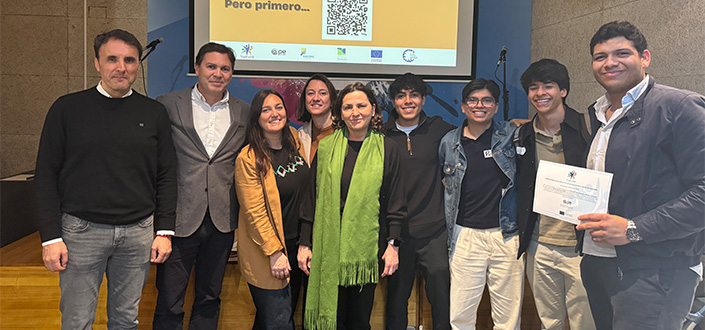The students of the Degree in Business Administration and Management (ADE) of the Universidad Europea del Atlántico (European University of the Atlantic, UNEATLANTICO), Cristopher Trejo, Marcelo Solís, Diego Weil, José Nelson Romero and Pedro Chávez participate in the Hackathon YouForSE, held at the Espacio Joven of the Santander City Hall.
The event was co-funded by the European Union and Global Shapers Santander, and represented an excellent opportunity for students to put into practice the knowledge acquired in class. Under the premise “How can we foster a culture of social entrepreneurship among the youth of Cantabria?”, the students had to develop a concrete proposal around this idea.
First-year student Cristopher Tejo participated in a group with four students from different universities, which allowed him to develop collaborative and adaptive skills. Tejo’s team won the second place prize for the initiative they proposed entitled «GIVEcan». Tejo emphasizes that «the experience was extremely gratifying, as I was able to work with them (her teammates) for the whole day to address a topic that until then I did not know in depth: the social economy. This field has a great impact and I was fascinated to discover it».
On the other hand, the initiative presented by another group of UNEATLANTICO students was «Eco-Solutions for You», a project focused on training, advising and empowering young people to become actively involved in the social economy ecosystem. Marcelo Solís, sub-delegate of the University, and member of the team that presented this project, highlighted that «it was an enriching experience, where we applied our knowledge in a real, collaborative and social change-oriented environment. The whole team really enjoyed the process and we experienced firsthand how training at UNEATLANTICO allows us to develop ideas with impact».
In recognition of their participation, the students received a certificate that not only symbolizes their involvement in the event, but also UNEATLANTICO’s commitment to offer training experiences that connect students with reality and foster their personal and professional growth.
Finally, it is worth highlighting the promotion of these initiatives from the Academic Direction, led by Dr. Silvia Aparicio, with the aim of promoting activities with direct impact on the Cantabrian society. Likewise, the European University of the Atlantic particularly values this proposal, which was coordinated by Isabel Cuesta, European Projects Coordinator of the European Projects Office of the Government of Cantabria.


